#deescalation
Text
There's been an idea to create a t-shirt design to bring awareness to the Indigenous people of Siberia/Russia. The symbol used will be a pattern that is commonly used and individualized by different tribes as an honor of spiritualism. I'll post a picture below.
The t-shirt will be in blood red color and will have the words "Decolonize and Deescalate" on it. A couple of Indigenous people came up with the idea and the design and it's in the works.
It's time for the Indigenous people to finally be seen and heard.

#indigenous#culture#indigenous russia#indigenous russian#important#russia#fypシ#fypage#colonization#landback#decolonize russia#decolonize#deescalation#indigenous rights#indigenous people#siberian indigenous#indigenous siberian#siberian#awareness
156 notes
·
View notes
Text
[...] Vimes stepped out into the evening air.
There were people hanging around out there, in little groups of three or four, talking among themselves and occasionally turning to look at the Watch House.
Vimes sat down on the steps and took a sip of his cocoa.
He might as well have dropped his breeches. The groups opened up, became an audience. No man drinking a nonalcoholic drink had ever been the center of so much attention.
He'd been right. A closed door is an incitement to bravery. A man drinking from a mug, under a light, and apparently enjoying the cool night air, is an incitement to pause.
Terry Pratchett, Night Watch
#samuel vimes#sam vimes#night watch#discworld#terry pratchett#mob#mob mentality#police#law enforcement#people#group think#psychology#deescalation#bravery#an incitement to pause#the glorious 25th of may
249 notes
·
View notes
Text
PSA on deescalation
Listen to the person! Yes, when people are angry they don't always communicate clearly and sometimes say things that they don't mean. But they are still intelligent human beings capable of knowing how they feel.
Leave the situation! If it's safe, leave the situation! It takes two to tango and it's harder to fight when you don't have an enemy anymore. If the person is telling you to leave you probably should.
Also you should almost never trap or prevent the other person from leaving! Letting someone who is upset leave allows them to get some space alone, get space from the conflict, feel safer, and get some adrenaline out by moving. You may feel it's not safe to leave the person or let the person leave. But try to balance those concerns with the fact that it's not fair to hold them hostage in a situation they don't feel safe in, at that point you're antagonizing them. Also you should respect that person's autonomy and judgement, they know themselves better than you do and often they want to avoid the conflict escalating as well.
Validate the other persons emotions! This helps show concern and make someone feel heard, which helps stem the conflict and stress. You don't have to apologize or deny what they did is wrong but express understanding and compassion for the distress they are feeling.
Express concern not judgement! If you think they "need help" ask if they "are okay?" ask if they need help. But don't tell them to "calm down."
Communicate your concerns! If you're concerned that safety of the the other person or other people if you leave the situation let them know. You might be able to work out a deal so that they walk a certain way so that you can see them get away safe. You can give them resources. This also communicates concern.
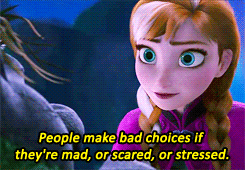

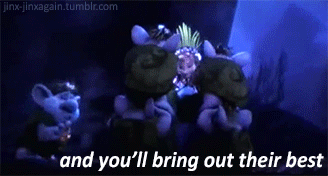
This all comes from what I've learned studying psychology and education. As well as from working in schools and mental hospitals. I don't have time right now to include references but if you curious about things mentioned I encourage you to look up deescalation techniques as well as the individual techniques I've mentioned.
#tips#safety#safety tips#emotion regulation#emotional regulation#stress management#parenting#conflictresolution#conflict resolution#frozen#fixer upper#anger management#anger issues#psa#deescalation#mental health#ableism#road rage#post#important#psychology#counseling#therapy
26 notes
·
View notes
Text
As someone who speaks fluent old lady, the trick to deactivate most potential Karens is to mirror them and then bring the energy down. Like if they come in like "WTF the app isn't working!" you go "OMG, that thing is always acting up! Bring it over here for me to fight it for you! I got this!"
Like you can disarm them by promising to fight the issue for them. And by letting them know they're not in trouble for not understanding the app. Like no Karen, nobody is going to yell at you today, you are safe.
And as long as you point the angst towards an inanimate object, then nobody gets hurt.
4 notes
·
View notes
Text
Deescalating Anger and Tension by Going in Sideways
A bit of a weird post for this blog… I’m a new(ish) parapro, and have often found it difficult to get some children to follow directions by directly addressing the issue… so I tried a few different things.
In my brief time working in this field, I’ve found some kids are kind of like oobleck (bear with me): if you go into a situation too fast, they’ll resist with equal force and form a hard barrier; but if you go in slowly, at an angle, they’ll be more inclined to listen.
Useful for parents, childcare workers, educators, or yourself…
1.) Pick out a word they said and randomly tell them a fun fact. Expound upon it.
For instance: One kid said something like “You’re so stupid and no one cares about you, you’re weak like an omega wolf” to another kid as an insult, which got another kid asking about what “omega” meant. I took that as an opportunity to infodump about the Greek alphabet, explain the etymology of the word “alphabet,” then tell them the Hebrew translation “aleph-bet.” They were fully intrigued. Whenever they’d start to get mad at each other again, I’d drop another fun fact.
It didn’t entirely stop the insults from flying; but it stalled them from throwing punches (or chairs or desks) until the teacher got there, who was able to straighten them out better than I could.
2.) The fidget toy.
Gently pull the distressed child away from the child who is teasing them (tell the other child to back off in a firm voice). Let them cool off a bit. Ask them how they’re feeling and affirm them. Talk to them if they want to talk, or remain silent if they don’t.
Quietly pull out a fidget toy (I recommend a Tangle because it’s more visually appealing), and start fidgeting. Wait for them to look at it. Ask if they’d like to try. If they agree, let them borrow it; if not, leave them alone (you kind of have to read the room pretty accurately on this one). If I do get the kid to borrow the fidget toy, I find they’ll usually calm down within a few minutes and it’s super effective.
I’ve found this one works best if they’ve never seen you with the fidget toy before; because the second time you pull it out they’ll know it’s for their benefit which may put them off. Some kids will ask for the fidget toy if they’re stressed out, which is always a good sign.
So basically, it’s potent; but use it wisely.
3.) Ask “What are you thinking right now?”
Pretty self-explanatory. If a kid looks like they’re reaching the boiling point and are about to hit another kid; try to get them to verbalize their feelings, and maybe it’ll get them to think about the consequences before doing anything like they’re thinking. Always say “It’s okay to feel angry; but we shouldn’t hurt people,” or some variation thereof. Don’t push too much though. Make it clear you’re there for them without necessarily taking sides.
4.) Point out the environment.
Once a couple kids were absolutely refusing to come back in from recess. It was a hot day outside, so I remarked “Don’t you want water? It’s really hot out.”
“No water.”
“You guys are all gonna be baked potatoes if you don’t go in; it’s HOT. I might just have to get some cheddar, sour cream, and bacon bits so I can eat you. I love baked potatoes. Yum.”
“We’re in the shade. We’re not hot.”
“Well I’m not in the shade; and I can’t go in until you go in, and it’s too hot for me out here. Guess I’ll become a baked potato, then.”
They went inside shortly after, complaining it was too hot outside. Basically use a lot of repetition so they start feeling the effects, and maybe start considering, “Hm… maybe they’re not just blowing hot air.” (or whatever the kids call hot air nowadays)
5.) Ask another kid for help.
Sometimes a kid might be anxious around adults, and won’t want to hear from you at all. They may be at risk of running away, and your close (but necessary) presence would only trigger them to do that.
I was having a hard time getting [Kid A] to come in to tell their account of what they saw two other kids doing which led up to a fight. They didn’t do anything themselves, and their behavior was probably caused by a fear of having to go to the office to tell their side of the story.
I wasn’t about to chase this kid because 1.) it wasn’t right in this situation 2.) they had a history of eloping, and 3.) they were too fast for me to catch if they did elope
Enter [Kid B], who is friends with [Kid A]. They’re wondering what’s wrong, so I explain, “Hey, your friend is a little scared of having to go to the office to tell about a fight. Can you tell them for me, that they’re not in trouble, and the office just wants to hear what they saw.”
It worked. I thanked [Kid B] and gave them a school reward ticket.
3 notes
·
View notes
Text
Watching how two dogs who love each other will sometimes still nip each other on the ear, bug them while they sleep, etc... watching how cats will snuggle with their buddy all day and then paw-smack 'em in the face, chase them, play-fight...
Makes me, as a fellow social mammal, feel better about my urge to be incredibly annoying to another human sometimes. Like, yeah. Of course I wanna bug you. Of course it's fun to annoy you. We're social creatures and annoyance can be part of play, something we all need. And I watch these dogs who get their ears nipped, cats who get smacked out of a nap, and despite BEING annoyed, they don't stop loving their packmate. After they finish play-fighting, they're back to snuggling and grooming and sleeping together. BEING annoyed is also just part of being in a social group and having relationships... and that's okay. It doesn't erase love or necessarily make them mad or affect them in the long term... a loved one being annoyed with me is a temporary feeling that's normal for social creatures. An annoyance that wouldn't be possible WITHOUT that love
#and much like dogs and cats#we have ways of saying 'not right now i don't wanna play grr get away for real'#which is when the deescalation kicks in
24K notes
·
View notes
Text
Steve Schmidt ... "De-escalation. Have you heard the word yet on cable news?
Suddenly, it is everywhere, all at once. Make no mistake — it is pernicious, obscene, and unique to Israel.
The word is premised upon a history of Jew hatred that stretches back to antiquity, and represents a singular proposition that has endured through the centuries, but ended forever in 1948."
#dr rex equality news information education#graphic source#graphic#graphics#hortyrex ©#horty#quote#it is what it is#steve schmidt#Deescalation#israel#Jew hatred#antiquity#occupiers#oppressors#worldwide
0 notes
Text
Remember what, exactly?
I've seen this quoted at least three times in the past couple of weeks, once here on tumblr and other times on facebook:
You shall remember what Amalek did to you on the way, when you went out of Egypt, how he happened upon you on the way and cut off all the stragglers at your rear, when you were faint and weary, and he did not fear God.
[then some stuff about how someday you might want to forget but don't forget!]
Dvarim 25
I mean, it's powerful. The people (all self-identifying as Jewish) who posted this wondered what it meant to "remember" or "not forget." And then every one of them came to the conclusion it meant Jews are always under threat, their enemies are vicious and heartless, and they are constantly surrounded by people who will murder them with no conscience or empathy.
What. The. Fuck.
How do you not even consider that the meaning might be "Don't be like Amalek"?
Of course, there's also the fact that there are an awful lot more passages in the Torah, Talmud, etc. that explicitly call for nonviolence and perspective taking.
I'm not super knowledgeable about Torah etc. I grew up conservative Christian. That does mean that I spent a good deal of time studying Rabbinical opinions here and there to try to understand the Old Testament, but for slightly (cough) different reasons.
On the other hand, I fucking know how to do basic critical thinking.
Imagine reading only 3/4 of Ender's Game and thinking it was an instruction manual.
Imagine going to your local Christian church and hearing,
"Brothers and sisters, remember how the early Christians were thrown to lions and murdered in their homes. Remember how the saints were tortured and killed without remorse or mercy. What lesson should we learn from these events? That's right: don't trust anyone except Christians, and buy more guns."
TBF there are some Christians who think like this. They are wrong. This thinking, ironically, is behind a lot of Christian antisemitism: "The Jews murdered our God! Never forget!" is how you get multigenerational antisemitic prejudice and violence.
Okay, your ancestors were persecuted horribly. There can be a lot of ways to incorporate that into how you live your life right now, and how you think about the world. How do you get to a place where the only interpretation you can possibly think of is, "everyone's out to get us so we need to always be ready to get violent?" Hell, even Jews right now are calling for compassion and de-escalation.
An "enemies are everywhere and they will kill us as soon as look at us" mentality is how the Mountain Meadows massacre happened. I was LDS (i.e., Mormon) for 40+ years, so I've been on this propaganda-to-information ride. Some Mormons, BTW, still do see themselves as marginalized, persecuted people. It's kind of ridiculous, but this persecution complex drives social and political behavior.
"Enemies are everywhere" and "Remember what these assholes did to our forefathers" is how you get blood feuds. It's how you get an endless cycle of violence. The history of European law has an important arc from before the middle ages through the 16th century (ish; apologies to historians) of gradually moving away from blood feuds toward the rule of law itself. "You killed my sister so I kill your whole family" was gradually replaced by "No matter how hurt you are, you don't get revenge; the state will impose a reasonable consequence and you will deal with it." The prevention of revenge has been very, very good for the world.
But when it's nations, who prevents revenge? Who stops the blood feud? (Note: If you say "the UN" you get partial credit and are invited to write an extra research paper on the history of the UN).
Imagine a reasonable response to the horrific Hamas attacks on Israel. Imagine a response aimed at ending the cycle of violence, instead of "you murdered some of our women and children so we will murder all of yours." What would such a response look like? It's a very tough question to answer fully, but the answer probably doesn't look like dehumanization, bombing, displacement, and starvation.
I am imagining 100 years from now Palestinians (if there are any left) will be telling their children,
You shall remember what Israel did to you in Gaza, how they expelled you from your homes and bombed you on your way and killed women and children with bullets and starvation, how they prevented international aid when you were faint and weary... Never forget.
Y'all better hope their takeaway is "don't be like Israel."
Actually, I'm pretty sure something like this has been told by Palestinian mothers to their children for almost a century. I don't think the cycle is going well. I think the people with more power have a chance (they have always had a chance) to work toward de-escalation.
#israel#palestine#hamas#mormons#lds church#violence#revenge#blood feud#deescalation#cycle of violence
0 notes
Text
Tell Congress to Support De-escalation and Diplomacy in Israel/Palestine - RootsAction
Tell Congress to Support De-escalation and Diplomacy in Israel/Palestine
Tell Congress to Support De-escalation and Diplomacy in Israel/Palestine – RootsAction
https://rootsaction.org/support-de-escalation-diplomacy-in-israel
View On WordPress
0 notes
Text
Two psych-based de-escalation tips
From Psych Central:
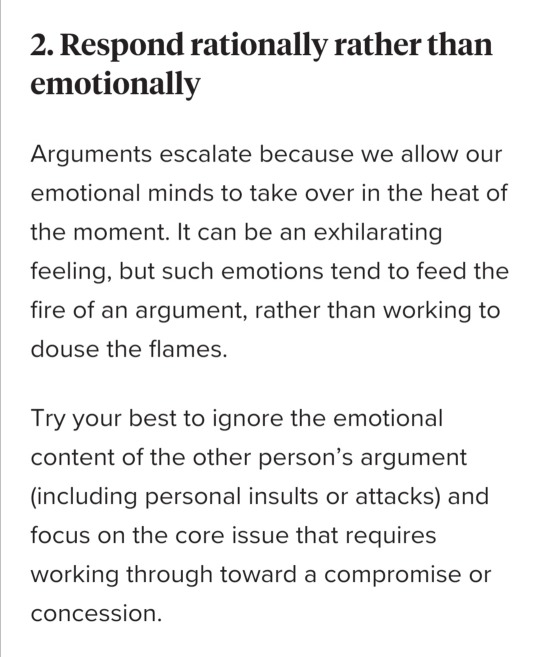
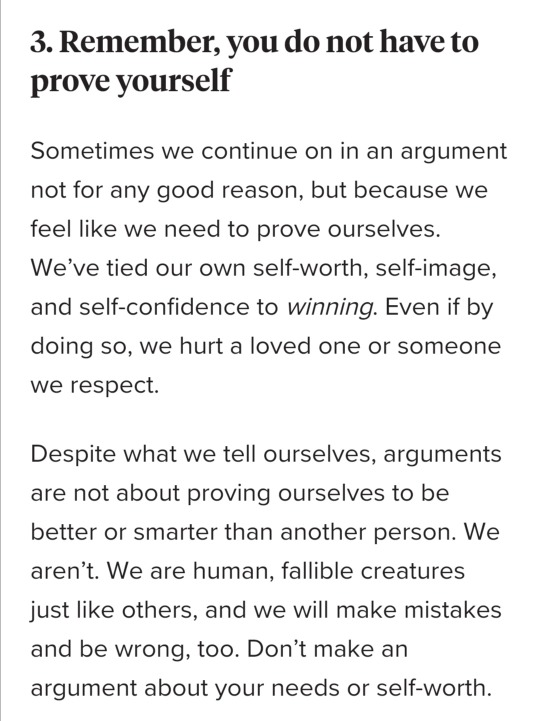
There's a lot of unspoken/unmet emotional and mental needs when people fight without reason.
More often than not, the triggered emotion is a past emotional wound that hasn't had a chance to heal. Or conditioning that someone else had put onto them.
A trained eye would know the right questions to ask to single out a moment or moments in time of a person's life that require reframing.
In the interim, de-escalate.
And ask, what unmet need is the aggressor trying to fulfill here?
Perhaps they're not too good at verbalising their needs so they resort to fighting?
0 notes
Text
'I miss you too but we have some things to figure out...let's take it slow.' That's good news right? From the man that moved heaven and earth for me, that's a positive sign? My BPD hearing 'you're not my favourite person anymore and I'm wary of you and won't do anything for you to comfort you, reach out or make your life better.' You saying you will hopefully figure out how you feel together and me hearing you don't feel the SAME and you saying it's a chance that we could walk out together and me hearing that we're NOT. This is what I battle, these are the consequences of what I did, this is what I have to live with. To all of you with BPD, it's confirmed, if you push hard enough, they do leave.
#BPD#borderline personality disorder#episodes#splitting#triggers#abandonment#breakups#deescalation#building#union#separation#twin flames#working on the relationship
1 note
·
View note
Text
Shirt has been made.


#indigenous#culture#indigenous russia#indigenous russian#important#russia#fypシ#fypage#colonization#landback#siberian indigenous#indigenous siberian#siberian#decolonize russia#decolonize#deescalation#Deescalate#fypツ#fyppage#fyp#indigenous art#indigenous rights#indigenous people#stop asian hate#stop putin#stop the genocide#stop the war#stop russia
23 notes
·
View notes
Text
instagram
conversationswithjustice TW: distressing content
Via @yourhumanrightsllawyer An 11 year old child was shot in the chest by a police officer — after he called 911 to help his mother.
Thank god this baby survived. According to his mother and the family’s attorney, he is completely traumatized and will require counseling. His family is calling for the officer who shot him, Greg Capers, to be fired immediately.
#aderrienmurry #justiceforaderrienmurry #blm #nojusticenopeace #policebrutality #useofforce #gunviolence #deescalationtraining #deescalation #policeviolence #mississippi #indianola #uspolitics #humanrights #childrensrights #blacklivesmatter #policereform
#aderrienmurry
#Instagram#aderrienmurry#justiceforaderrienmurry#blm#nojusticenopeace#policebrutality#useofforce#gunviolence#deescalationtraining#deescalation#policeviolence#mississippi#indianola#uspolitics#humanrights#childrensrights#blacklivesmatter#policereform
1 note
·
View note
Text
Find J.T. the L.A. Storyteller on TikTok
@jimbotimes Are there really any alternatives to calling LAPD to support unhoused people? YES, let’s talk about CIRCLE (Crisis and Incident Response through Community-les Engagement. #unhoused #hollywood #losangeles #crisisresponse #policingalternatives #circleprogram #outreach #deescalation #decompressioncenters #LGBTQyouth #wellnesscheck #traumainformedcare #loscuentos #jmbtms#greenscreenvideo…
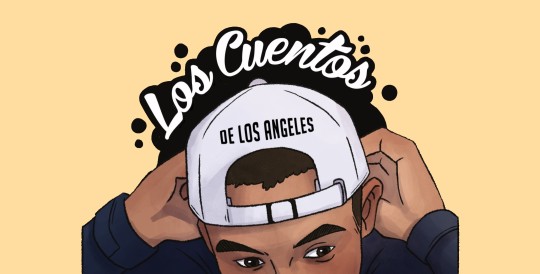
View On WordPress
#crisis response#deescalation#events#hollywood#homelessness#jimbo times#Los Angeles#los cuentos#policing alternatives#TikTok
0 notes
Link

Dominique Davis and his Community Safety Ambassadors have provided public safety for encampment outreach without guns or badges for the last two years. COURTESY OF WE DELIVER CARE
-
Without much notice to the public, a police alternative pilot program has been operating on Seattle’s streets for the last two years. Through a partnership with JustCARE, a local public safety firm called We Deliver Care has been protecting outreach workers who are serving people experiencing homelessness. They’ve also been providing de-escalation services for people in crisis, and they’ve been doing it all without the involvement of a uniformed cop.
Now, with JustCARE’s future in question due to uncertainty around how city leaders will find funding, this promising program could also be on the chopping block. With the City still struggling to fully staff the police department, letting We Deliver Care fall by the wayside would remove a ready-made solution for providing public safety in the absence of police.
Dom Davis created We Deliver Care with his co-founder, Stephenie Wheeler-Smith, during the protests surrounding George Floyd’s death in the summer of 2020. The two longtime community leaders took notice when Seattle Public Schools suspended its contract with the Seattle Police Department, and they worried that fully defunding SPD would leave communities in South Seattle without anyone to provide public safety.
While the City never really defunded SPD, the lack of any other organization offering de-escalation services provided We Deliver Care with an immediate opportunity. That's when JustCARE, a partnership between several organizations focused on outreach to people living in encampments in Pioneer Square and in the International District, reached out to Davis in search of alternative public safety responses.
Since its inception, the organization has grown to employ 25 Community Safety Ambassadors, and it has also completed a short-term contract to provide public safety for the Low Income Housing Institute. To support that growth, Davis relies on his extensive network of community ties to identify and recruit people with lived experience of the criminal legal system who want a job that allows them to give back to the community.
After the program’s first year of operation, researchers with the University of Washington conducted a study of JustCARE that included findings about the work We Deliver Care does with the organization. Their analysis showed a 39% reduction in 911 calls in the neighborhoods where they operate, and a 12% reduction in 911 calls from the hotels where the program provides shelter.
The only remaining question is whether City leaders will find a way to keep JustCARE, and consequently Davis’s We Deliver Care, sustainably funded. The program’s current funding will expire at the end of this month, and the program will shut down unless the City can find $10 million per year to keep it in operation.
#Community Safety Ambassadors#JustCARE#We Deliver Care#deescalation#homelessness#seattle housing#housing and homelessness#SPD#2020 protests#seattle politics#seattle#Low Income Housing Institute#police alternatives#behavioral problems#local police#seattle crime#community safety#local organizations
0 notes
Text
I'm always saying the wrong thing and then I say more things...
I cannot talk my way out of this one, lads
1 note
·
View note